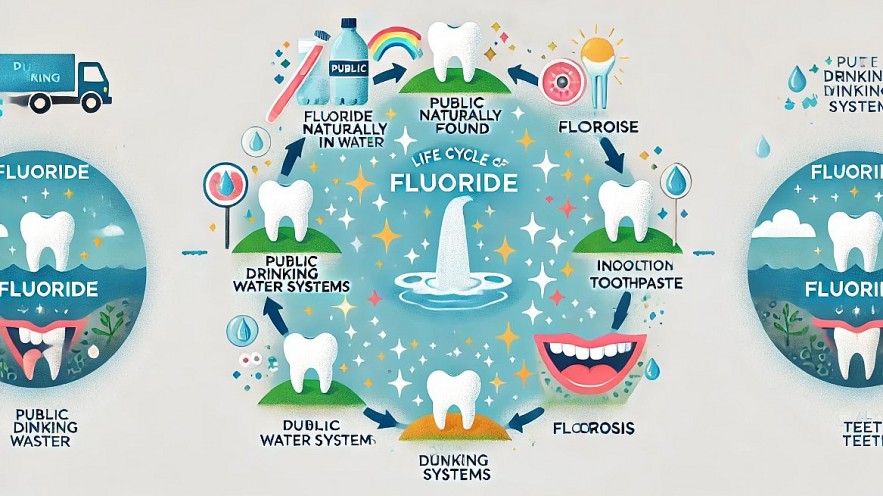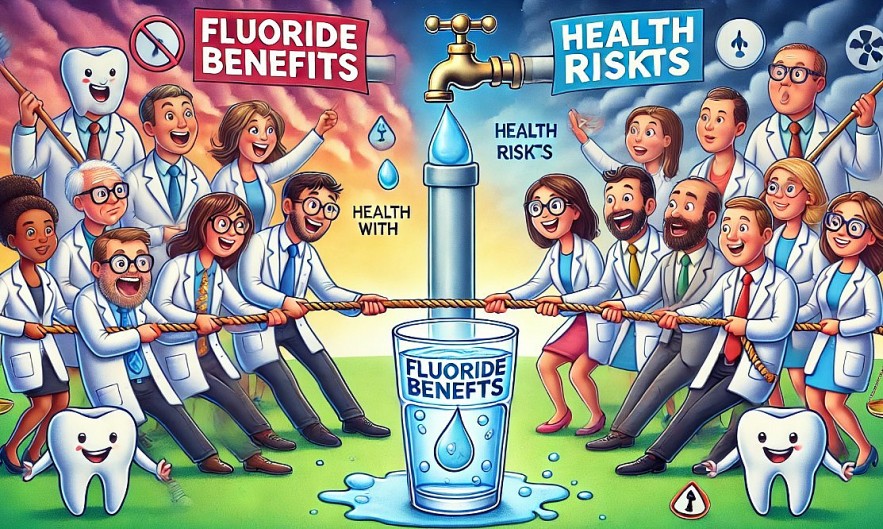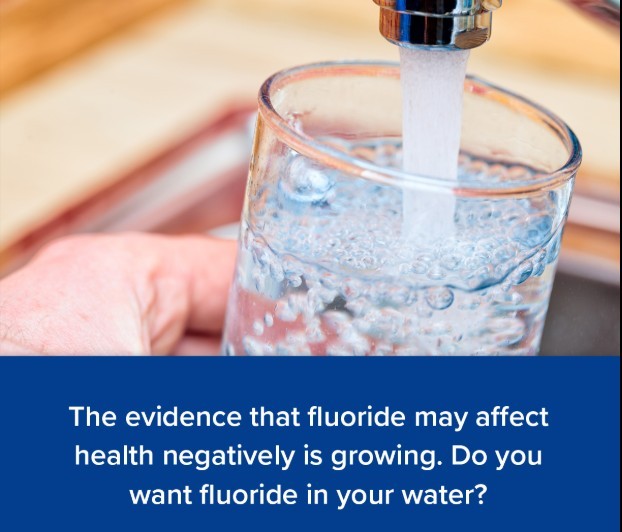What is Fluoride and Will It Be Banned in the U.S. After Kennedy's Statement
Fluoride has been a topic of much discussion in the United States, especially following Robert F. Kennedy Jr.’s vow to remove it from the nation's drinking water. For decades, fluoride has been both praised as a public health achievement and criticized as a potential health risk.
 |
| The Journey of Fluoride |
What is Fluoride?
Fluoride is a naturally occurring mineral found inwater, soil, and certain foods. It is also added to various products like toothpaste and mouthwash to help protect teeth. The main reason fluoride is added to drinking water is its proven ability to prevent tooth decay. Since the 1940s, fluoride has been used in community water systems in the U.S. as part of a public health initiative.
Fluoride strengthens tooth enamel and reduces the growth of harmful bacteria in the mouth, making teeth less prone to cavities. The Centers for Disease Control and Prevention (CDC) lists water fluoridation as one of the ten greatest public health achievements of the 20th century.
Why Is Fluoride Added to Drinking Water?
In the early 20th century, researchers discovered that people living in areas with naturally fluoridated water had fewer cavities. This led to the introduction of water fluoridation programs in the 1940s and 1950s. By adding small amounts of fluoride to public water supplies, communities saw a significant reduction in dental issues, particularly in children.
Today, about 73% of Americans who use public water systems receive fluoridated water. The U.S. Public Health Service recommends a fluoride concentration of 0.7 milligrams per liter, which is considered safe and effective for preventing tooth decay.
The Controversy Surrounding Fluoride
 |
| The Tug-of-War Over Fluoride |
Despite its widespread use, fluoride has been a controversial topic for decades. Critics argue that it poses potential health risks, while supporters emphasize its safety and benefits for dental health. Here are the main points of contention:
1. Fluoride’s Health Risks
Some studies suggest that excessive fluoride consumption may lead to health issues, such as:
Dental fluorosis: This condition occurs when children consume too much fluoride while their teeth are developing. It causes white spots or discoloration on the teeth. While usually mild, severe cases can affect tooth structure.
Skeletal fluorosis: Prolonged exposure to high levels of fluoride can weaken bones, though this is rare in the U.S.
Thyroid and neurological concerns: A few studies have linked high fluoride exposure to thyroid problems and reduced IQ levels in children. However, these studies are often conducted in areas with significantly higher fluoride levels than what is found in the U.S.
2. Ethical Concerns
Some people believe that adding fluoride to drinking water infringes on individual freedom. They argue that individuals should have the choice to consume fluoride, rather than having it added to a public water supply without consent.
3. Questions About Necessity
In modern times, many people use fluoride toothpaste and other dental products. Critics question whether water fluoridation is still necessary, especially with advancements in dental care and education.
Robert F. Kennedy Jr.’s Position on Fluoride
Robert F. Kennedy Jr., an environmental attorney and 2024 presidential candidate, has been vocal about his opposition to fluoride in drinking water. Kennedy claims that fluoride poses significant health risks and has pledged to remove it from the nation’s water supply if elected.
Kennedy’s stance aligns with some anti-fluoride advocacy groups who believe that water fluoridation is outdated and potentially harmful. However, his position has sparked debates among public health experts, dentists, and policymakers.
Will Fluoride Be Banned in the U.S.?
At present, fluoride remains widely used in public water systems across the U.S. Removing it would require significant changes in federal and local policies. Here are some factors to consider:
1. Support from Major Health Organizations
Major health organizations, such as the CDC, the American Dental Association (ADA), and the World Health Organization (WHO), continue to endorse water fluoridation. They argue that it is a safe, cost-effective way to improve oral health, particularly in underserved communities.
2. Local Decisions
Water fluoridation policies are often determined at the local level. While some cities and towns in the U.S. have opted to remove fluoride from their water supplies, the majority continue to support it.
3. Public Opinion
Public opinion on fluoride varies. Some Americans strongly support water fluoridation for its dental health benefits, while others remain skeptical. The debate over fluoride has become more prominent following Kennedy’s pledge, potentially influencing future policy decisions.
What Would Happen If Fluoride Were Removed?
If fluoride were removed from public water systems, the U.S. could see an increase in dental health issues, particularly among low-income communities that may have limited access to dental care. Fluoridated water has been shown to benefit people of all ages, reducing tooth decay by an estimated 25%.
However, removing fluoride might address concerns from those who worry about its potential health risks. It could also shift the focus to other preventive measures, such as improving access to dental care and education.
Conclusion
Fluoride has been a cornerstone of public health efforts in the U.S. for decades, significantly reducing tooth decay and improving dental health. However, it remains a divisive topic, with passionate arguments on both sides. Robert F. Kennedy Jr.’s pledge to remove fluoride from the nation’s drinking water has reignited the debate, bringing attention to questions about its safety, ethics, and necessity.
While fluoride is unlikely to be banned nationwide in the immediate future, Kennedy’s statement could influence discussions and policies at both local and national levels. The future of fluoride in the U.S. will likely depend on a balance between public health priorities, scientific evidence, and public opinion. For now, fluoride remains a key element of dental health initiatives, continuing to spark conversations about its role in modern society.
FAQs About Fluoride and Its Role in the U.S.
1. Is fluoride safe to consume in drinking water?
Yes, fluoride is considered safe at the levels used in public water supplies. Health organizations such as the CDC and the American Dental Association (ADA) endorse water fluoridation as a safe and effective way to prevent tooth decay. However, excessive fluoride intake can lead to conditions like dental fluorosis or, in rare cases, skeletal fluorosis.
2. Can I opt out of consuming fluoridated water?
If your local water supply is fluoridated and you prefer not to consume it, you can use water filtration systems designed to remove fluoride or rely on bottled water that is fluoride-free. Be sure to check product labels or consult manufacturers for details about fluoride content.
3. Why do some cities and towns in the U.S. stop fluoridating their water?
Some communities choose to discontinue water fluoridation due to public pressure, ethical concerns, or debates about its necessity given the widespread availability of fluoride dental products. Others may stop due to budgetary constraints or concerns over health risks, though these are often not backed by major health organizations.
4. Is fluoride linked to reduced IQ in children?
Some studies have suggested a possible link between high fluoride exposure and lower IQ in children, but these studies were typically conducted in areas with fluoride levels much higher than those found in the U.S. The scientific community has not reached a consensus, and most experts agree that fluoride at recommended levels is safe.
5. What happens if fluoride is removed from drinking water?
Removing fluoride from drinking water could lead to an increase in tooth decay, especially in communities with limited access to dental care. While fluoride toothpaste and other dental products can help, water fluoridation provides consistent, community-wide protection against cavities for people of all ages.
 Top 7 Quirky Drinks in Japan You Should Try Top 7 Quirky Drinks in Japan You Should Try Finding a tasty drink while traveling around Japan can be an adventure in and of itself. There are many alcoholic beverages unique to Japan that ... |
 Best Four Delectable Drinks for Weight Loss in Sleeping Best Four Delectable Drinks for Weight Loss in Sleeping Forget about tight diets and exhausting workouts if you routinely consume these four drinks that claim to flatten your stomach and eliminate abdominal fat without ... |
 4 Drinks That Cause Children to Puberty Early 4 Drinks That Cause Children to Puberty Early According to some studies, early puberty in children has a long-term impact on their psychology. Because of changes in their bodies, children often feel shy ... |
 Toasting Drink Traditions Around the World: Origin, Unique Rituals Toasting Drink Traditions Around the World: Origin, Unique Rituals In many cases, there is a great deal more to the act of toasting than simply raising a glass. This is because toasting is a ... |

























